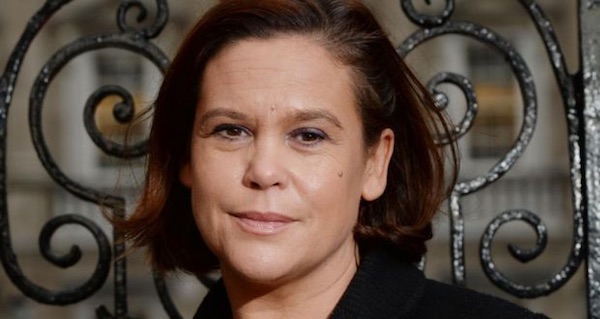
Mary Lou McDonald will be confirmed as the next leader of Sinn Fein within two weeks. A look at the woman who has set herself the challenge of leading the party into government in the 26 Counties.
Born in Rathgar in Dublin, Mary Lou McDonald has two brothers and a sister and is a proud mother of two.
She was educated at Notre Dame Des Missions in Churchtown, Trinity College, the University of Limerick and Dublin City University, studying English Literature, European Integration Studies and Human Resource Management.
She was originally a member of Fianna Fail, but left in 1998. She shifted her allegiance to Sinn Fein and within months of her entry, she became identified with the leadership’s attempts to appeal to a more diverse demographic.
A moderate republican her entire political life, she once served as Vice-Chair of the Irish National Congress organisation. She skilfully espoused the Sinn Fein position in the face of countless smear campaigns, infuriating her political opponents who sought to depict her as merely a party spokeswoman.
Despite occasional electoral setbacks, she ascended quickly through the party hierarchy and made Sinn Fein history in 2004 by becoming the party’s first member of the European Parliament. In 2007 she was shortlisted for the ‘MEP of the Year’ award by the European Parliament magazine watching for “making the most valuable contribution in the field of employment policy”.
However, she remained focused on a seat in the Dublin parliament. After failing to secure a seat in the Dublin West constituency in 2002, she and her husband moved northside to Cabra, and she sought the party’s support to run in the highly competitive Dublin Central constituency in the 2007 general election.
The party threw all its resources behind her, but the campaign fell just short. Then Taoiseach Bertie Ahern managed to get Cyprian Brady over the line with a significant vote transfer.
Two years later she ran in the European elections but failed to retain her seat when her constituency was reduced from four to three seats. Nevertheless, Sinn Fein appointed her deputy leader and gave her even more public prominence. The move paid off when the party tripled its seats to a record 14 in the 2011 general election, and McDonald was one of two women elected for the party.
Her performance over the next five years escalated Sinn Fein to new heights in the 26 Counties. Her impressive performances on Leader’s Questions and at the Public Accounts Committee won a raft of new voters. Her work on behalf of the survivors of the Magdalene Laundries and woman’s rights issues received national recognition.
In February 2016, she easily topped the poll in Dublin Central with more than 24% of the vote, and two years later, she stands on the cusp of being confirmed as Sinn Fein leader.
Once asked to identify her favourite speech, she pointed to Constance Markievicz’s ‘Women, Ideals and the Nation’, delivered in Dublin in 1909 to the Students’ National Literacy Society. Ms McDonald wrote:
“This speech was delivered by Constance Markievicz nine years before she was to become the first woman elected to the Dail and ten years before she was the first female politician in Europe to hold a ministerial office. She, like so many women at that time, held a vision of a united Ireland forged equally by men and woman.
“It is worth remembering that not long after Markievicz delivered her speech John Dillon, then Deputy Leader of the Irish Parliamentary Party stated that ‘Women’s suffrage will, I believe, be the ruin of our Western civilisation. It will destroy the home, challenging the headship of man, laid down by God.’
“Republican women and the Countess alike challenged this view believing the ‘old idea that a woman can only serve her nation through her home is gone’, declaring ‘now is the time, on you the responsibility rests. It may be as a leader, it may be as a humble follower... perhaps in a political party, perhaps in a party of your own... but it is there.’”
![[Irish Republican News]](https://republican-news.org/graphics/title_gifs/rn.gif)
![[Irish Republican News]](https://republican-news.org/graphics/title_gifs/harp.gif)

